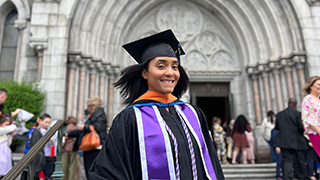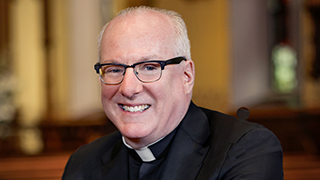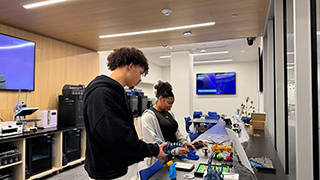The Impact of COVID-19 on Sports Media - Seton Hall University
Wednesday, April 1, 2020
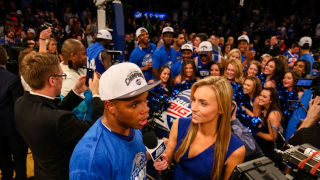
Schecter and Buehler are both faculty members in the College of Communication and the Arts and recently addressed the topic of sports media as it pertains to COVID-19.
How is the Sports Media industry being affected by the current state of COVID-19, such as with sports, tournaments, and now the Olympics being cancelled?
Schecter:
The novel coronavirus has affected sports like nothing in history. Usually when there
is a significant world event, sports serve as a distraction and a way to unify people.
We saw that with 9/11, Hurricane Katrina and many other events throughout history.
In this pandemic, sports is a central part of the story, part of the problem. The
virus easily spreads in large crowds and I think it will be months, if not years,
before people feel comfortable attending events with 80,000-plus people.
Buehler:
To speak specifically to sports television, the last few decades have witnessed a
huge rise in the number of sports television outlets — a rise that first followed
along with the growth of cable television and then, more recently, the growth of internet-distributed
television. To a great extent, the expansion of sports television over the last few
decades has relied on live sporting events — not just to generate live event coverage
itself, but also to generate content that can be discussed in the many studio shows
that also fill these outlets' programming schedules. Without those live sporting events,
these many sports television outlets have had to look to alternative programming to
fill their schedules. A notable example has been the many outlets uncharacteristically
turning to replays of older event telecasts. Of course, the loss of live event coverage
has dramatic financial implications. As more and more television viewers either time
shift or watch on demand, and in the process bypass advertising, live sports coverage
has had great appeal for advertisers, with viewers largely reluctant to watch sporting
events on delay. Both advertisers and sports television networks will be struggling
to adjust to the loss of that valuable programming. More generally, sports television
networks will, like the rest of the television industry, also potentially have to
adapt to a broader decline in advertising as companies reevaluate their marketing
budgets.
What are broadcasters and sports journalists talking and writing about?
Schecter:
There are still a lot of stories to cover and write about. The beauty of sports is
it touches every part of society and is ingrained in our culture. Nearly everyone
can relate to sports. In addition, famous athletes (and even some journalists) have
a tremendous platform on social media. Many are now using that platform to communicate
with the general public and urge them to practice safe measures and social distancing.
Buehler:
Without live sporting events to generate coverage, broadcasters have placed even greater
emphasis on transactions, with the NFL's free agency period dominating the coverage
on many sports television outlets. In recent decades, sports media coverage has increasingly
focused on managerial activities, with more and more attention paid to player transactions
and other roster maneuverings. This trend is perhaps best exemplified by the increasing
interest in NFL draft coverage over the last few decades. Unsurprisingly, too, the
coronavirus and its effects on the sports world have also dominated discussions.
What role have sports journalists played during this pandemic?
Schecter:
A sports journalist is still a journalist, and many have been showcasing their reporting
and storytelling skills in news, business and community reporting. They have told
and shared so many good stories. They have also spread the message to take the stay-at-home
measures seriously (see NBA broadcaster Mike Breen's video on social media) and have
shifted to covering the news of the pandemic.
How do you foresee the next few months taking shape as it relates to Sports Media?
Schecter:
Sports is going to play a central role in our recovery and getting back to normalcy.
When live sporting events return, people will feel safer and better about things.
Many events will begin without fans in attendance, but slowly we'll get back to normal.
I truly believe that once people feel safe going to a baseball or basketball game,
they will feel safe resuming their normal lives.
Buehler:
Without any certainty regarding the return of live sports, I would expect transactional
coverage to continue to play a large role. For example, I would assume that as many
outlets as possible will supersize their NFL draft coverage. I also expect that the
effects of the coronavirus will continue to dominate coverage, with many discussions
centering around either what it might mean to resume suspended seasons or to transition
into new ones. Moreover, television networks will likely also keep experimenting with
other types of programming that might be able to fill their programming schedules,
such as esports coverage. Meanwhile, television networks and advertisers will continue
to have to figure out how to adjust to inevitably lower ratings and the loss of event
coverage that could be counted on to gather large, live audiences.
Do you have any tips to share with students/community on how to stay tuned with the sports industry during this time?
Schecter:
Support media outlets and read, watch and consume everything you can. There is tremendous
journalism and storytelling out there. Learn from it and try and add to it. Students
have the opportunity to add to the conversation. For instance, Pirate Sports Network
seniors Joe Binder and Keith Egan did an incredible job with the series that chronicled
the men's basketball team's journey through this special season. If you haven't seen
their "One Shining Moment" video yet, you can watch it and the other chapters here.
Buehler:
In the Future of Sports Media class that I'm offering this semester — now online —
I've been asking my students to pay careful attention to sports television programming
schedules. These schedules make it abundantly clear how much sports television networks
have had to adjust over the last few weeks. These altered schedules then also make
it apparent just how much these outlets typically rely on live event coverage.
About Our Experts
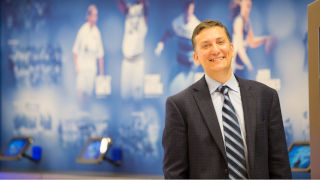
Currently the editorial director for Baseball America, Schecter has an illustrious background with 25 years of sports media experience. Students in Schecter's classes directly benefit from his industry experience in editing, writing and producing sports-related content for major media outlets. He has taught journalism courses at high-profile universities throughout the New York metropolitan area, the sports media capital of the world, including Columbia University, CUNY Graduate School of Journalism, Fordham University and the University of New Hampshire School of Law.
An accomplished multimedia editor, Schecter worked in a variety of roles at Sports Illustrated. Over the years, he has supervised investigative teams, reported on college sports, managed website content and edited special projects such as "Crime in College Football" and "50 Most Influential Minorities in Sports." Prior to Sports Illustrated, Schecter spent five years as a reporter with The Boston Globe.

Categories: Athletics




